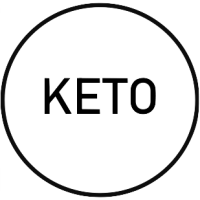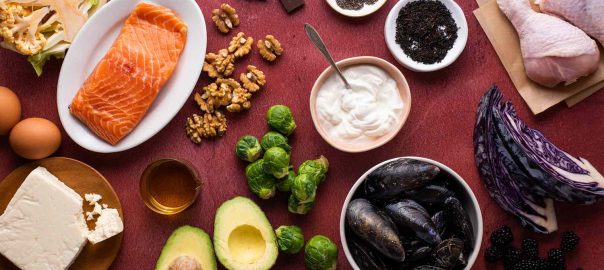Keto for Seniors
Tailoring Low Carb Diets for Older Adults
As the keto diet continues to grow in popularity, more seniors are beginning to experiment with it and explore the potential health benefits. While keto has gained a strong reputation for supporting weight loss and improving energy levels, it also offers unique advantages for older adults, such as promoting cognitive health and helping to manage chronic conditions. However, older adults who are looking to embark on a keto diet should pay special attention to what they’re eating to make sure they’re addressing their unique nutritional and medical needs.
Below, we’ll explore the potential benefits of keto for seniors, how to adjust macronutrient ratios and calorie intake, key nutritional concerns, and practical tips for transitioning to and maintaining a senior-friendly low carb lifestyle.
The Potential Benefits of Keto for Seniors
The keto diet, which is based on high fat, moderate protein, and a very low carb intake, induces a metabolic state in your body called ketosis. In this state, the body burns fat for energy instead of glucose. For many seniors, this metabolic shift can bring a variety of health benefits.
- Cognitive Health
As we age, maintaining cognitive function becomes a priority. Emerging research suggests that a keto diet may help support brain health by providing ketones as an alternative fuel source for the brain. This can be particularly beneficial for seniors at risk of neurodegenerative diseases like Alzheimer’s, which has been referred to as “type 3 diabetes” due to its association with glucose metabolism issues. Additionally, ketones may have neuroprotective properties that help reduce oxidative stress and inflammation in the brain.
Learn more about the link between Alzheimer’s and Type 3 Diabetes.
- Blood Sugar Control
Many older adults face challenges with blood sugar regulation, including type 2 diabetes and prediabetes. The keto diet can help to stabilize blood sugar levels by reducing your carbohydrate intake, leading to fewer blood sugar spikes and improved insulin sensitivity. This can reduce the risk of complications associated with diabetes, such as nerve damage and cardiovascular issues.
- Weight Management
Maintaining a healthy weight becomes more challenging with age due to changes in metabolism and muscle mass. The satiating nature of a high-fat diet can help seniors manage hunger and reduce calorie intake naturally, supporting weight loss or maintenance. For seniors with obesity, keto can be a powerful tool for improving mobility and reducing the strain on your joints.
- Reduced Inflammation
Chronic inflammation is linked to many age-related conditions, including arthritis, cardiovascular disease, and autoimmune disorders. Keto’s anti-inflammatory properties, partly due to the reduction in sugar and processed carbs, can help alleviate symptoms of these conditions. By reducing markers of inflammation, seniors may experience improved joint health and overall vitality.
- Improved Energy Levels
Switching to fat as the primary energy source can provide more stable and sustained energy levels throughout the day. Seniors often report reduced fatigue and improved endurance after adopting a keto diet, allowing them to stay active and engaged in their daily lives.
Adjusting Macros and Calorie Needs for Older Adults
As your metabolism slows down with age, you require fewer calories than younger adults. Tailoring the keto diet for seniors includes careful adjustments to macronutrient ratios and total calorie intake.
- Calculate Calorie Needs
To avoid overeating or undereating, seniors should determine their daily caloric requirements based on their basal metabolic rate (BMR) and activity level. Online calculators can help estimate these needs, but consulting with a dietitian helps ensure accuracy.
- Modify Macronutrient Ratios
A typical keto macronutrient breakdown is 70-75% fat, 20-25% protein, and 5-10% carbs. For many seniors, their protein intake should be slightly higher to support muscle maintenance and repair. Aim for 25-30% of calories from protein, especially if muscle loss is a concern. This adjustment helps ensure that you can maintain your strength and functionality.
- Incorporate Healthy Fats
Focus on heart-healthy fats, such as:
- Avocados – Packed with monounsaturated fats and potassium.
- Olive oil – A staple for cardiovascular health.
- Fatty fish – Rich in omega-3 fatty acids that support brain and heart health.
- Nuts and seeds – Great sources of healthy fats, fibre, and micronutrients.
- Choose Nutrient-Dense Foods
With a reduced daily calorie intake, seniors must maximize the nutritional value of every bite. Prioritize whole, nutrient-dense foods like leafy greens, cruciferous vegetables, eggs, and high-quality protein sources. Incorporating a variety of colourful vegetables into your diet helps to ensure you get a wide range of vitamins and minerals.
Addressing Nutritional Concerns for Seniors on Keto
The aging process brings specific nutritional challenges that must be addressed when designing a keto diet for seniors.
- Bone Health
Bone density tends to decline with age, increasing the risk of fractures. To support bone health, ensure an adequate intake of:
- Calcium – Found in many keto-friendly foods like leafy greens, almonds, and cheese.
- Vitamin D – Supplementation may be necessary, especially for seniors with limited sun exposure or in the wintertime. Pair with healthy fats for better absorption.
- Magnesium – Found in nuts, seeds, and dark chocolate, magnesium supports bone density and muscle function.
- Muscle Mass Preservation
Loss of muscle mass (sarcopenia) is a common concern for many older adults. Prioritize protein-rich foods, like eggs, lean meats, and seafood, to meet daily protein requirements. Resistance training or light weight training can help further maintain your muscle mass and improve overall strength and stability.
- Electrolyte Balance
The keto diet can lead to an initial loss of water weight and electrolytes. Seniors should monitor their intake of sodium, potassium, and magnesium to help prevent dehydration and muscle cramps. Bone broth, leafy greens, and keto-friendly electrolyte supplements can help replenish lost minerals.
- Digestive Health
Older adults may experience changes in digestion. Incorporate fibre-rich, low carb vegetables like broccoli, cauliflower, and zucchini to help support gut health. Probiotic foods, such as unsweetened yogurt, kefir, and fermented vegetables like kimchi or sauerkraut can also help promote a healthy gut microbiome.
- Heart Health
Given the prevalence of cardiovascular issues in older adults, it’s crucial to focus on heart-healthy foods. Fatty fish, nuts, seeds, and olive oil are all excellent choices. Avoid trans fats and heavily processed foods that can contribute to poor heart health.
Keto-Friendly Foods for Seniors
Simplicity is key to planning meals for seniors. Focus on keto-friendly foods that are easy to prepare, nutrient-dense, and gentle on the digestive system.
Breakfast Ideas
- Scrambled eggs with avocado and spinach.
- Greek yogurt with chia seeds and a sprinkle of nuts.
- Low carb almond flour pancakes topped with sugar-free syrup and fruit.
Lunch Options
- Tuna or chicken salad with olive oil-based mayo on a bed of greens.
- Low carb vegetable soup with shredded chicken.
- Grilled salmon and cucumber wraps using lettuce leaves as the wrap.
Dinner Suggestions
- Baked salmon with asparagus and a drizzle of olive oil.
- Ground beef stir-fried with zucchini noodles and coconut aminos.
- Roast chicken thighs with cauliflower mash and steamed green beans.
Snack Ideas
- Cheese cubes with cucumber slices.
- Hard-boiled eggs.
- Keto-friendly protein bars (look for those with minimal artificial ingredients).
- Pork rinds dipped in guacamole.
Convenience Foods
For days when cooking is a challenge, consider pre-made keto meals, frozen low carb entrees, or high-quality meal replacement shakes designed to fit into a keto diet.
Medication Considerations When Starting Keto
Seniors and older adults are often on multiple different medications, and the keto diet can interact with certain drugs. It’s essential to consult with a healthcare provider before making significant dietary changes, especially for:
- Diabetes Medications – Keto can rapidly lower blood sugar levels, potentially requiring adjustments to insulin or oral diabetes medications.
- Blood Pressure Medications – The initial drop in water weight may lower blood pressure, necessitating a change to your medication or dosage.
- Anticoagulants – Some keto-friendly foods, like leafy greens, are high in vitamin K, which can affect blood-thinning medications like warfarin.
The Importance of Medical Supervision
Seniors should never start a keto diet without medical guidance. A doctor or dietitian can:
- Monitor changes in blood sugar, cholesterol, and kidney function.
- Adjust medications as needed.
- Provide tailored advice and dietary recommendations to address your individual health concerns.
Regular check-ins can help ensure the diet is safe and effective. Nutritional deficiencies can also be identified and corrected early with proper, professional support.
Gentle Ways to Transition to a Low Carb Diet
For seniors new to keto, a gradual transition can ease the adjustment period and reduce the likelihood of side effects like the “keto flu”. Here’s how to start:
- Gradually Reduce Carbs
Instead of cutting carbs all at once, start by eliminating processed sugars and refined grains. Once your body has adjusted to that change, reduce starchy vegetables and high carb fruit over several weeks. This gradual approach allows the body to adapt more comfortably.
- Increase Healthy Fats Slowly
Introduce healthy fats like avocado, nuts, and olive oil incrementally to allow the digestive system to adapt. This step helps minimize potential digestive discomfort.
- Prioritize Hydration
Drink plenty of water and incorporate electrolyte-rich foods like bone broth, to prevent dehydration during the transition. Herbal teas and unsweetened beverages can also support hydration.
- Experiment with Keto Meals
Test keto-friendly recipes and find dishes that suit your personal taste and dietary needs. Start with simple meals that require minimal preparation, and gradually build a repertoire of go-to recipes that you and your family love.
- Incorporate Intermittent Fasting (Optional)
For any older adults and seniors who are comfortable with it, intermittent fasting can complement keto diets and help improve your overall outcome. Begin with a light fasting schedule, such as a 12-hour fast overnight to help ease into this practice.Learn more about combining intermittent fasting with keto.
Low Carb Grocery Makes Transitioning to Keto Easy
The keto diet can offer seniors a path to improved health, supporting cognitive function, blood sugar control, and overall well-being. However, tailoring the diet to your unique needs – including calorie requirements, macronutrient adjustments, and addressing specific nutritional concerns, is crucial for success.
By consulting with healthcare professionals, incorporating nutrient-dense, easy-to-prepare foods, and transitioning gradually, seniors can adopt a low-carb lifestyle that supports their health and vitality in their golden years. For those interested in exploring keto further, Low Carb Grocery offers a wide range of products to make the journey enjoyable and sustainable.
Did you know that we offer free shipping Canada-wide on all orders over $99?
More Low Carb Lifestyle Articles
Top Snack Foods
Discover the ultimate guide to keto and low carb snacking! We’ve compiled our favourite snacks and sweets that are both delicious and diet friendly! From chocolatey treats to savoury bites, we’ve got something for everyone!
Zero Carb Foods
Maintaining a low carb diet can be challenging, but with the right foods, it doesn’t have to be. This article is packed with product recommendations to help you stay on course. Discover how to fully embrace a keto or low carb diet with delicious meals that satisfy every craving.
Is Going Low Carb Healthy?
Interested in making the switch to a low carb diet but worried about adverse health effects? Learn more about the role that carbs play in your diet and how they affect your overall health and fitness goals to determine if a low carb diet is the right choice for you.
30 Low Carb Foods
Looking for delicious and satisfying meals that fit into your low carb lifestyle? Explore our list of 30 healthy low carb foods, including pantry staples and specialty products.
Getting Started with Keto
The keto diet, as it is commonly known, has surged in popularity due to the dramatic results that people have experienced. However, there remains some skepticism about how it works from those who are new to high-fat and high-protein eating. Learn more about this diet here.





















